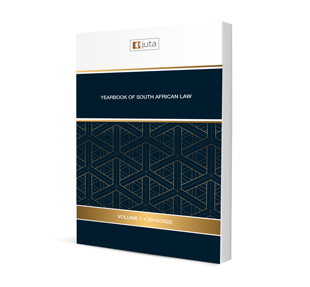Family Law

Family Law
Author Andra Le Roux-Kemp
ISSN: 2710-0677
Affiliations: Associate Professor, University of Lincoln (UK)
Source: Yearbook of South African Law, Volume 1, p. 667-699
https://doi.org/10.47348/YSAL/v1/i1a12

ISSN: 2710-0677
Affiliations: Associate Professor, University of Lincoln (UK)
Source: Yearbook of South African Law, Volume 1, p. 667-699
https://doi.org/10.47348/YSAL/v1/i1a12

ISSN: 2710-0677
Affiliations: BLC; LLB; LLM; LLD (Pret) Professor of Law, University of South Africa: Attorney of the High Court of South Africa.
Source: Yearbook of South African Law, Volume 1, p. 700-712
https://doi.org/10.47348/YSAL/v1/i1a13

ISSN: 2710-0677
Affiliations: BIur LLB LLM (UP) LLD (UJ). Professor of Private Law, University of Pretoria.
Source: Yearbook of South African Law, Volume 1, p. 713-779
https://doi.org/10.47348/YSAL/v1/i1a14

ISSN: 2710-0677
Affiliations: BA(Hons)(Rhodes) B Iuris LLB (SA) LLM PhD (Rhodes), Advocate of the High Court of South Africa; formerly professor and head of the Department of Law, Rhodes University.
Source: Yearbook of South African Law, Volume 1, p. 780-884
https://doi.org/10.47348/YSAL/v1/i1a15

ISSN: 2710-0677
Affiliations: B luris (cum laude) LLB LLM LLD (Potchefstroom), Professor of Law, University of Stellenbosch.
Source: Yearbook of South African Law, Volume 1, p. 885-941
https://doi.org/10.47348/YSAL/v1/i1a16